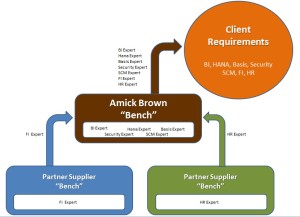By Alyanna Espina, Business Development at Amick Brown
When my bosses told me that I was getting trained to become a Recruiter, my heart started racing and the feeling of panic started to sink in. All these questions were floating in my head, where do I begin? Is there a cheat sheet to becoming a recruiter? How do I learn about all of this technology? I have to talk to strangers? In other words, I had no idea of what I was getting myself into or what I was going to do.
Moving forward a year later, I found that recruiting is not as difficult as it seemed to be, it’s actually enjoyable. If you are willing to learn and are ready to put in the hard work, then you are on your way to becoming a successful recruiter. Yes, it is challenging at first because you are talking to complete strangers and trying to convince them about the job offer you have. But, it’s all worth it in the end knowing that you are actually making a difference in someone’s life.
In the IT industry, finding the right fit candidate is one of the biggest hurdles when recruiting in this specific field. There are tons of positions available, but not a large enough pool of candidates to choose from. This goes against the norm of our society in which finding the right kind of job is also an issue for people outside of the IT world. Regardless, getting that call from a recruiter is just exactly what you are waiting for. There are recruiters out there who truly enjoy their work and there are others who are doing it for the paycheck. Needless to say, we can all tell the difference between the two. Of course, it is true, that the job provides a huge opportunity to earn a good amount of incentive when your candidates gets placed, but you have to work really hard to get to that point. If you have sales skills and can provide excellent customer service, then that is something you can apply to recruiting. Who knows that may even earn you a spot at the top one of these days. Perhaps, you may even own a recruiting business in the future.
Here are five pointers that will help you, if you are just starting out as a recruiter.
- It’s basically match making – you take the requirement that the job position has and match it with the qualifications of the candidate. If it doesn’t match, let them know that you will contact them when there is a more suitable job offer that matches their skills.
- Time management and organization is a must – When you are recruiting for a job, it is very important to manage everything that needs to be done within the stipulated time period. Not only that, you must have everything organized, documents, contact information, etc. You are most likely going to be working with people in different time zones. So, you must be mindful of their time when you set up a call. It helps to be prepared, that’s when organization comes in.
- There is no “I” in TEAM – you will have to be a team member all throughout the entire process. As a recruiter, you are not only working with your immediate co-workers, you are also working with numbers of people out there. It could be your clients’, candidates’ employers or the candidates themselves. Different people, mean different styles and personalities. So, having the ability to work in a team will make your job easier.
- Communication is key – I can’t emphasize enough how important communication is in the recruiting world. So many things can go wrong, if you don’t hone in on your communication skills. Heck, it may even be the reason why you lose a candidate to the next recruiter. Having the right communication skills is the key to building a relationship with others in the market. It is by far one of the most important factors in business of any kind, in this case, recruiting.
- Be tech savvy – there are many aspects of recruiting that requires you to use technology. Therefore, it is important that you know how to make use of computer technology. There are job boards, database systems, and networking tools that you will have to use when recruiting. So, if you aren’t tech savvy, then it will be difficult for you to keep up with the job requirements.
I’ve only listed out 5 pointers, but there are far more beyond than what I have written. Some skills are meant to be learned as you get yourself situated in your recruiting position. No matter how much research or studying we do for a position, nothing beats learning from doing the actual job. Keep in mind that staying positive and working hard has no alternatives, there’s no shortcut to get to the top.






